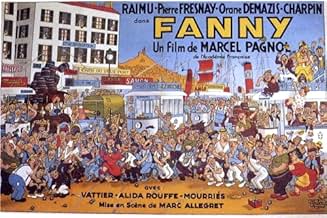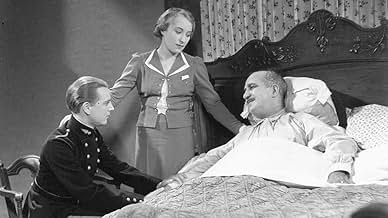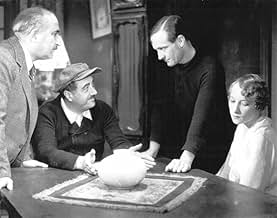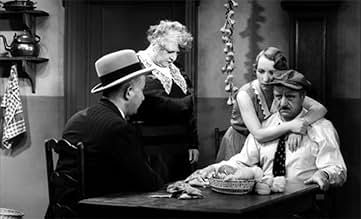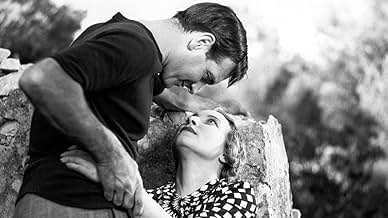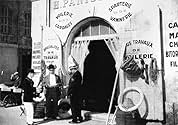IMDb RATING
7.8/10
2.1K
YOUR RATING
After Fanny's boyfriend leaves her and sails away, she finds out she's pregnant.After Fanny's boyfriend leaves her and sails away, she finds out she's pregnant.After Fanny's boyfriend leaves her and sails away, she finds out she's pregnant.
Fernand Charpin
- Honore Panisse
- (as Charpin)
Auguste Mouriès
- Félix Escartefigue
- (as Mouriès)
Robert Vattier
- Albert Brun
- (as Vattier)
Édouard Delmont
- Dr. Felicien Venelle
- (uncredited)
Pierre Prévert
- Un voyageur du tramway
- (uncredited)
Annie Toinon
- Amélie
- (uncredited)
Featured reviews
If you can get by the first fifteen minutes, get into the leisurely pacing and that fact that nothing is going to explode and no one shoots anybody or stabs anyone in the eye, and the film is about learning to live with other human beings, about being a parent, about falling and staying in love, perhaps you'll come to love this film, too.
The trilogy is set in another time long gone--Marseilles, a provincial fishing village, where Cesar and his son operate a sort of bar where locals drift in and out and play cards; a pretty young woman sells seafood outside, and she's known son Marius since they were children. Enough said: except that the acting is amazingly naturalistic for a 1930's film, that the performance by famed French entertainer Raimu is beyond words, is simply astounding in his range of emotions, his understanding of the human condition. This understated drama is a quiet masterpiece.
The trilogy is set in another time long gone--Marseilles, a provincial fishing village, where Cesar and his son operate a sort of bar where locals drift in and out and play cards; a pretty young woman sells seafood outside, and she's known son Marius since they were children. Enough said: except that the acting is amazingly naturalistic for a 1930's film, that the performance by famed French entertainer Raimu is beyond words, is simply astounding in his range of emotions, his understanding of the human condition. This understated drama is a quiet masterpiece.
Part two of Marcel Pagnol's wonderfully simple, but, mind me, not simple-minded Marseilles trilogy is even funnier and more touching than its predecessor, thanks to expanded supporting roles and a broader variety of outdoor locations.
The dialogue is as humorously and emotionally rich as ever and the cast, almost outshone by Raimu's terrific performance, works wonders with their lines.
The pace may drag slightly from time to time and some story aspects feel redundant, but the basic concerns of Pagnol's deeply philanthropic approach to issues like paternal love, social constraints and diverging attitudes towards life offer more than enough pleasures.
8 out of 10 suspicious premature births
The dialogue is as humorously and emotionally rich as ever and the cast, almost outshone by Raimu's terrific performance, works wonders with their lines.
The pace may drag slightly from time to time and some story aspects feel redundant, but the basic concerns of Pagnol's deeply philanthropic approach to issues like paternal love, social constraints and diverging attitudes towards life offer more than enough pleasures.
8 out of 10 suspicious premature births
10rsoonsa
FANNY is the second film of a trilogy, based upon a play by Marcel Pagnol, from which all three works are taken, featuring most of the cast of excellent actors which made the stage original a great artistic and popular success, including Raimu, Charpin, Pierre Fresnay, and Orane Demazis as Fanny, an assemblage which remains faithful to the heart of the original. By repudiating the normal placement of concurrent French films made in Parisian studios, and producing the work in his native Marseilles, in Provence, Pagnol achieves a finely-hewn naturalism which is very congenial to the scenario, dealing as it does with a hard-working bourgeoisie whose lives are in concert with rhythms of a major seaport. Fanny's passionate attention to Marius (Fresnay) results in her pregnancy from their farewell coupling at the denouement of the first of the trilogy, MARIUS, with her lover falling prey to the lure of a seafaring life and she, abandoned, accepts a proposal of marriage from a much older M. Panisse (Charpin), in order to save the reputation of her family. The love of Panisse for the child of Fanny is the moving force in what must be the inevitable fulfillment of the storyline, i.e., the return of Marius to claim his erstwhile fiancée and his true child in a scene which brings the best from Demazis, Fresnay, and Raimu as Cesar, the father of Marius and lifelong friend of Panisse. Pagnol directed only the finale of the trio, and selects for FANNY Marc Allegret, who leads the cast with distinction, displaying particular skill when allowing Pagnol's magnificent dialogue to be developed in what is essentially a filmed work for the stage, with few sets, and who allows liberal emphasis upon the plastic Raimu, who is, after all, the most important presence in this romantic masterpiece.
Part the Second of this trilogy reminds us that at heart it is pure melodrama and if not quite 'dead! and never called me mother', it is certainly from the same stable. Arguably Orane Demazis - replicating here, as indeed are all the principals, her stage role as the eponymous seduced and abandoned and slightly enceinte ingenue - is the weakest link in an unusually strong chain yet even then with the handicap of being saddled with a role that today would be risible (I doubt if it is possible to 'SPOIL' a classic which is now some 72 years old so suffice it to say that as a result of 'giving herself' to Marius, shortly before he ships out on an extended cruise, Fanny finds herself in an 'interesting' position and must make some tough choices. Today, of course, it is practically an honor to fall pregnant with no father material in sight and a State standing by to cosset the resulting infant from cradle to grave but in 1932 the resulting 'shame' embraced not only the mother-to-be but also her family) she manages to elicit our compassion and keep our humor at bay. Pedants will have a field day with the dodgy arithmetic - Marius has supposedly signed up for a five-year voyage yet on his return Fanny's son is a mere 10 months old - but what matters is the acting-plus-believability factor and here, thanks as always to the great Raimu, aided and abetted by Fernand Charpin, Alida Rouffe and Milly Mathis they bring it off to a fare-thee-well. Pierre Fresnay as Marius does little more than play the fly-in-the-ointment in the closing quarter of the movie and may well have been looking ahead one full decade to 'Le Corbeau'. Building on the first part and moving seamlessly to the next stage this is a worthy successor to 'Marius'. 9/10
The sequel to "Marius" the year before stays in the same vein and is the same kind of staged theatre all the way, with the same kind of virtuoso performances by all the actors, but there is another director, and you miss the Alexander Korda flamboyance and liberal sweeps and flow of the movie tempo. This film is more like chamber theatre all the way, and you don't even see much of the harbour, the glorious ships, the street life and the joints. Fanny, left alone and pregnant by Marius going to sea for five years, marries another older suitor, just to give her child a future and safe environment, and it works out well, until Marius comes back after only two years as a most unsuspected surprise and does his best to complicate things but immediately leaves again. The story isn't much, it is very inferior to the first part, but there is a third part four years later, which will show the end of the story, directed by Marcel Pagnol, the author, himself - he made many films besides being a prolific Provence writer.
Did you know
- TriviaFamed restaurateur and founder of California cuisine, Alice Waters, was so taken with the Fanny trilogy that she named her Berkeley restaurant Chez Panisse. The café upstairs from the restaurant is decorated with posters from the films Marius, Fanny, and César. Waters also named her own daughter Fanny and opened a small breakfast café in Berkeley called "Café Fanny" in 1984 which closed in March 2012.
- ConnectionsEdited into Histoire(s) du cinéma: Une histoire seule (1989)
- How long is Fanny?Powered by Alexa
Details
Box office
- Gross US & Canada
- $8,262
- Opening weekend US & Canada
- $7,720
- Jan 8, 2017
- Gross worldwide
- $8,262
- Runtime
- 2h 20m(140 min)
- Color
- Aspect ratio
- 1.20 : 1
Contribute to this page
Suggest an edit or add missing content


